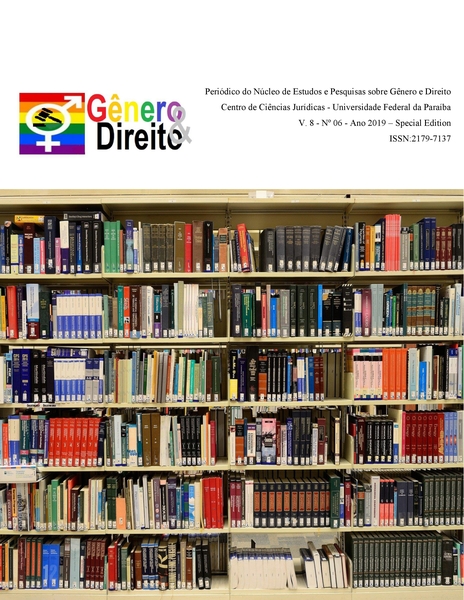THE PROBLEMS CONCERNING REALIZATION OF POWERS BY THE SUBJECTS OF THE RUSSIAN FEDERATION (BY THE EXAMPLE OF THE REPUBLIC OF TATARSTAN)
DOI:
https://doi.org/10.22478/ufpb.2179-7137.2019v8n6.49310Palavras-chave:
federalism, federal relations, division of jurisdiction and powers, contractual relations, implementation of legal norms, legal status of constituent entities of the Russian FederationResumo
This paper discusses conceptual and applied issues regarding the agreements between the federal centre and the subjects of the Russian Federation on the division of jurisdiction and powers. The paper reveals the historical background and reasons for the emergence of this legal institution, its consolidation in the Constitution of the Russian Federation and the Constitution of Tatarstan, the evolution of current domestic legislation, as well as the practice of applying the above institution. It is indicated that the distinction between objects of jurisdiction and authority is an integral element of the principle of federalism, which is one of the foundations of the state system of the Russian Federation. Also, the paper provides an extensive historical retrospective of the evolution of state and legal relations between the Russian Federation and the Republic of Tatarstan. In many ways, it was the experience of these relationships that influenced the development of the legal framework for regulating the issue of the current study. The accumulated experience of the functioning of state authorities on the basis of such agreements is evaluated, and an opinion is expressed on maintaining the potential of this legal institution for improving federal relations. In addition, an opinion is expressed on the need to develop the correct and competent use of this mechanism, which will allow the best qualities of the domestic constitutional model to show and open up additional growth opportunities for individual regionsDownloads
Não há dados estatísticos.
Referências
Locke J. Two Treatises of Government // The works. - London, 1751. - V. II. - P. 103–238.
Rae, John. Life of Adam Smith. - New York City: Macmillan Publishers, 1895.
Zhukova A.E. To the question of modern constitutional and legal problems of enshringing jurisdiction and exercising the powers of the constituent entities of the Russian Federation (on the example of the Rostov region) // Theory and practice of social development - 2017, No. 1. - P. 130.
Shakhray S.M. Unknown Constitution. Constitutio incognita. - M.: OJSC "Red Star", 2013. - P. 189.
Bluntschli Johann Kaspar. The theory of state // Batoche Books, 2000. - 491 p.
Materials of the 1st Constitutional Readings in the Republic of Tatarstan “Federalism as a guarantee of stability of statehood in modern conditions” (Kazan, November 10, 2016) - P. 13.
Daniel R. Kempton and Terry D. Clark. Unity or Separation: Centre-Periphery Relations in the Former Soviet Union. Praeger Publishers, 2002, p. 110.
Republic as part of Russian federalism / compiled and edited by scientific editor B.L. Zheleznov. - Kazan: KSU, 2010. - P. 39.
Interview by B.L. Zheleznov to newspaper "Realnoye vremya" on November 6, 2017. - https://realnoevremya.ru/articles/80563-kak-25-let-nazad-prinimalas-konstituciya-tatarstana.
Ivatskoy P.N. Discussions on the status of the constituent entities of the Russian Federation in the legal science of the 90s. XX century // Bulletin of Stavropol State University, - 2011, No. 73. - P. 215.
Goode, J. Paul (2011). The Decline of Regionalism in Putin's Russia: Boundary Issues. Abingdon, United Kingdom: Routledge. p. 95
Rae, John. Life of Adam Smith. - New York City: Macmillan Publishers, 1895.
Zhukova A.E. To the question of modern constitutional and legal problems of enshringing jurisdiction and exercising the powers of the constituent entities of the Russian Federation (on the example of the Rostov region) // Theory and practice of social development - 2017, No. 1. - P. 130.
Shakhray S.M. Unknown Constitution. Constitutio incognita. - M.: OJSC "Red Star", 2013. - P. 189.
Bluntschli Johann Kaspar. The theory of state // Batoche Books, 2000. - 491 p.
Materials of the 1st Constitutional Readings in the Republic of Tatarstan “Federalism as a guarantee of stability of statehood in modern conditions” (Kazan, November 10, 2016) - P. 13.
Daniel R. Kempton and Terry D. Clark. Unity or Separation: Centre-Periphery Relations in the Former Soviet Union. Praeger Publishers, 2002, p. 110.
Republic as part of Russian federalism / compiled and edited by scientific editor B.L. Zheleznov. - Kazan: KSU, 2010. - P. 39.
Interview by B.L. Zheleznov to newspaper "Realnoye vremya" on November 6, 2017. - https://realnoevremya.ru/articles/80563-kak-25-let-nazad-prinimalas-konstituciya-tatarstana.
Ivatskoy P.N. Discussions on the status of the constituent entities of the Russian Federation in the legal science of the 90s. XX century // Bulletin of Stavropol State University, - 2011, No. 73. - P. 215.
Goode, J. Paul (2011). The Decline of Regionalism in Putin's Russia: Boundary Issues. Abingdon, United Kingdom: Routledge. p. 95
Downloads
Publicado
2019-11-27
Como Citar
L. VASIN, A. .; V. KRASNOV, E. . THE PROBLEMS CONCERNING REALIZATION OF POWERS BY THE SUBJECTS OF THE RUSSIAN FEDERATION (BY THE EXAMPLE OF THE REPUBLIC OF TATARSTAN). Gênero & Direito, [S. l.], v. 8, n. 6, 2019. DOI: 10.22478/ufpb.2179-7137.2019v8n6.49310. Disponível em: https://periodicos.ufpb.br/ojs2/index.php/ged/article/view/49310. Acesso em: 19 nov. 2024.
Edição
Seção
Seção Livre

